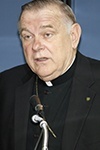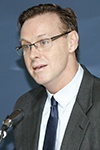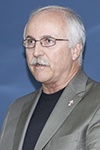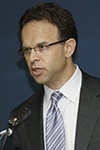By Ana Rodriguez Soto - The Archdiocese of Miami

Photographer: ANA RODRIGUEZ-SOTO | FC
At the start of the press conference, Archbishop Thomas Wenski recalls that "the Church has been involved with unaccompanied minors forever ... even before this humanitarian crisis hit the headlines. It is a humanitarian crisis and we want to resolve it in a humanitarian way."

Photographer: ANA RODRIGUEZ-SOTO | FC
Randy McGrorty, executive director of Catholic Legal Services in the Archdiocese of Miami, asks Miami's legal community to "rise once again to the challenge" of another refugee crisis, this one an "artificially created" one, by volunteering to represent unaccompanied minors in immigration hearings.

Photographer: ANA RODRIGUEZ-SOTO | FC
Deacon Richard Turcotte, executive director of the archdiocese's Catholic Charities, tells the press conference that these are children - now as young as 7 - who "want to be free" from economic oppression, gang violence and drugs. "What we can't lose sight of are the children's stories."
Randy McGrorty doesn�t have to. He�s seen it. So have the other attorneys who gathered for a press conference Aug. 1 at the archdiocesan Pastoral Center. They are working desperately to represent the unaccompanied minors who have been arriving in this country in increasing numbers for the past two years.
The attorneys, along with Archbishop Thomas Wenski, were protesting the fact that their already difficult work has just been made impossible. The Justice Department issued an order this month expediting the cases of any minor who arrived in the U.S. as of May 1, 2014.
The result: As of July 31, three Miami immigration judges have set aside their regular dockets to hear 150 cases a day � that is 50 cases per judge, per seven-hour workday. Similar situations are playing out nationwide. The immigration courts� 228 fulltime judges already are handling a load of more than 375,000 cases, and the average wait for a decision is 587 days.
McGrorty, executive director of Catholic Legal Services, called the Justice Department�s order an �artificial crisis� created for �political show.� He said he suspected it came not from the Justice Department but from �very high in the White House� and blasted the Obama administration for �using kids as political messengers.�

Photographer: ANA RODRIGUEZ-SOTO | FC
Cheryl Little, executive director of Americans for Immigrant Justice, urged President Obama to "immediately change this policy and give these children a fighting chance."

Photographer: ANA RODRIGUEZ-SOTO | FC
Manny Crespo, president-elect of the Cuban American Bar Association, called the Obama administration's expedited hearing policy "conveyor-belt justice" that is "cruel and unacceptable."

Photographer: ANA RODRIGUEZ-SOTO | FC
Jacob Ratzan, president of the South Florida Chapter of the American Immigration Lawyers Association, said "It�s all happening too fast. Too fast for children to get counsel. Too fast for children to get notice of deportation proceedings."
Just as �justice delayed is justice denied,� the archbishop said, in this case �justice expedited is also justice denied.�
�We�re not saying that every child will have to stay in the U.S. What we�re saying is that what we do should be about the best interest of the child,� Archbishop Wenski said. �What we should not do is short-circuit this by making a travesty of the immigration system.�
�Just when we thought things couldn�t get any worse � they did,� said Cheryl Little, executive director of Americans for Immigrant Justice. Her attorneys represented 1,600 unaccompanied minors at immigration hearings last year � and a similar number so far this year.
She noted that these children are �fleeing to save their lives.�
Nearly all the protagonists of the current crisis at the border are coming from Honduras � �the murder capital of the world,� Little said � along with El Salvador and Guatemala, countries that are viewed as among the five most dangerous in the world.
She noted that the United Nations High Commissioner for Refugees estimated that 60 percent of these children can make a case for �relief from deportation.� Issuing deportation orders in these cases �is tantamount to a virtual death sentence,� Little said.
�The immigration courts are extremely overburdened already,� said Jacob Ratzan, president of the Florida chapter of the American Immigration Lawyers Association. �It�s all happening too fast. Too fast for children to get counsel. Too fast for children to get notice of deportation proceedings.�
�This is a humanitarian crisis and it needs to be dealt with in a humanitarian way,� he added.
Lawyers, paralegals, immigration law students are all needed to provide representation to unaccompanied minors facing hearings in immigration court. A training session is scheduled for Monday, Aug. 4, at Catholic Legal Services, Ingraham Building, 25 S.E. Second Ave., Miami. Those who wish to help should email: [email protected] or leave a message and contact information at 305-914-2157.
Noting that Obama is a constitutional law professor who �should know the importance of due process,� Little urged the administration to �immediately change the policy and give these children a fighting chance.�
Regardless of one�s political party or immigration views, �conveyor-belt justice is wrong,� said Manny Crespo, president-elect of the Cuban American Bar Association and board president of its Pro Bono Project.
�It�s cruel. It�s unacceptable. It has no place in the American tradition of jurisprudence," said Crespo, whose group is actively recruiting attorneys � regardless of their area of legal expertise � to represent unaccompanied minors in immigration court.
�The community has really risen to the occasion,� said Lesley Mendoza, executive director of the Cuban American Bar Association�s Pro Bono Project.
The group has recruited more than 100 volunteer attorneys this year alone. The program they developed trains any lawyer � even those without trial experience, or those who work with contracts and tax law � to represent clients in immigration court.
�I was a corporate lawyer myself. I took on a couple (of immigration cases) on a pro bono basis. I learned how to do it. I fell in love with representing these children,� Mendoza said.
The attorneys at the press conference joined Archbishop Wenski in issuing a challenge to Miami�s legal community: Step up and volunteer to represent these unaccompanied minors.
McGrorty recalled Miami�s own history with refugee children, dating back to the early 1960s, when 14,000 were airlifted from Cuba in a space of two years. Then, in the Mariel summer of 1980, 125,000 Cubans and about 25,000 Haitians landed in Miami in the space of about six weeks. Another 25,000 people were evacuated from Haiti to Miami for medical reasons after the January 2010 earthquake in Port-au-Prince.
�Many of those were unaccompanied minors� who are now corporate and civic leaders, McGrorty said. �I�m asking Miami to rise once again to the challenge. We need your help.�
�What we cannot lose sight of are the children�s stories,� said Deacon Richard Turcotte, archdiocesan director of Catholic Charities, which began housing unaccompanied minors back in the 1960s. As is the case today, the agency shelters the minors temporarily until they can be placed with relatives.
He said the age of those coming now is �younger than we�ve ever seen before,� between 7 and 9 years old. And their stories �are about freedom. All they want is to be free from economic oppression, from gang violence, from the drugs. But most of all they want to be free to be a child, to live their lives without these oppressions.�
�In spite of all the political wrangling, it�s the story of the children that we have to keep in front of us,� Deacon Turcotte said.


Comments from readers